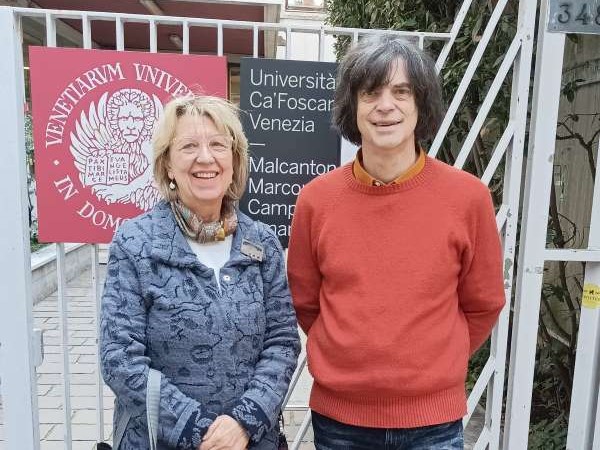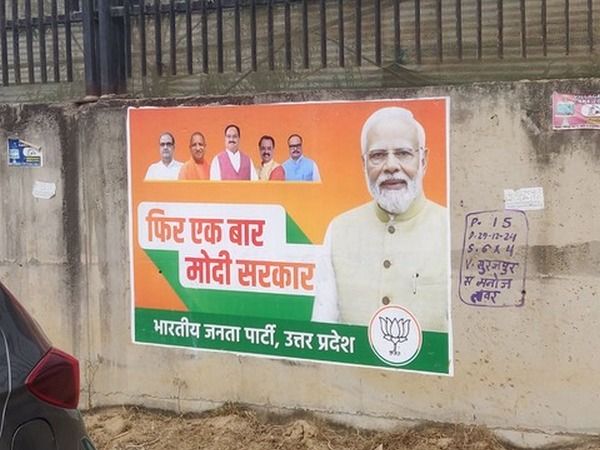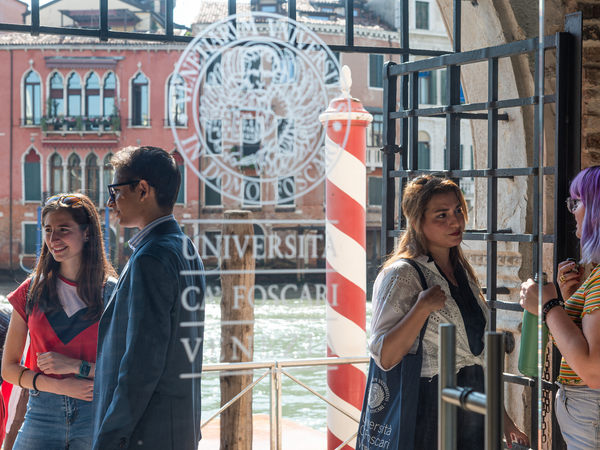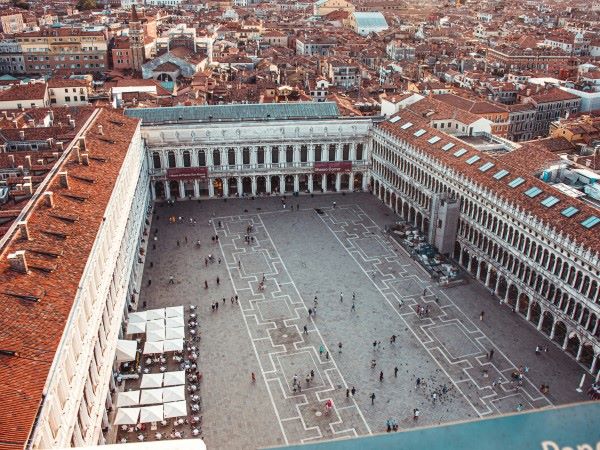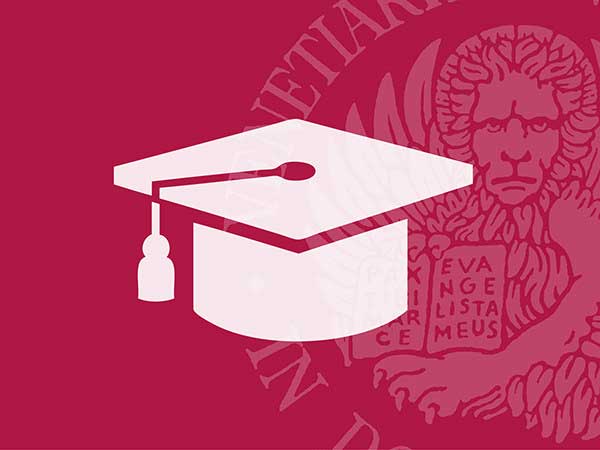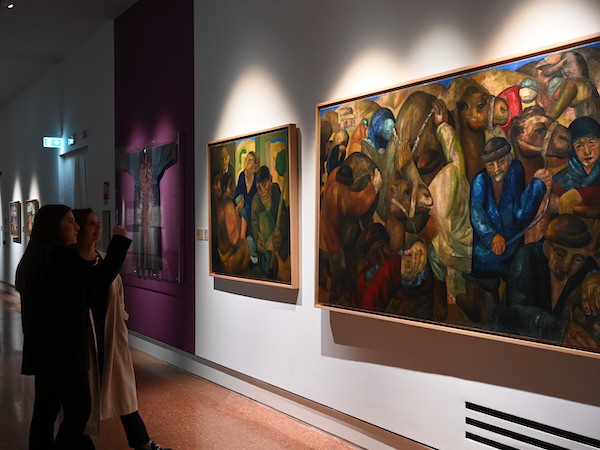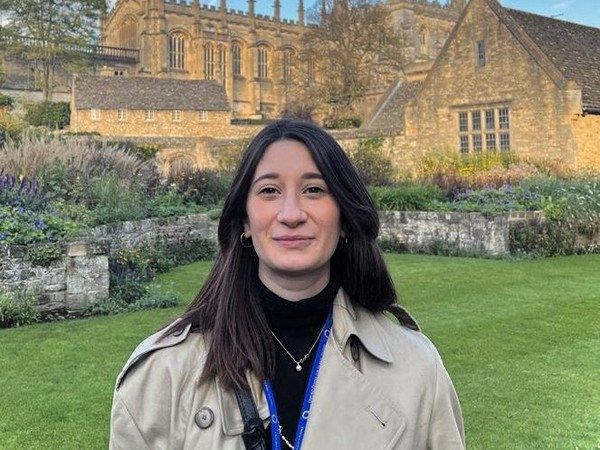Between March and April 2022, Ca’ Foscari’s Department of Humanities hosted Pierre Bonnechere, professor of Greek history at Université de Montréal, thanks to the Erasmus+ ICM Venice/Canada programme which involves the University of Montréal and the University of Ottawa and is coordinated by professor Claudia Antonetti.
Professor Bonnechere is an expert in the religion, culture and philosophy of the ancient Greeks. He has held the conference Whirling Greece. A neglected aspect of Greek thought and life and a series of lectures at Ca’ Foscari.
What is this international mobility programme like? We have asked Pierre Bonnechere and Claudia Antonetti to answer our questions.
Professor Bonnechere, you are an expert in Ancient Greece and in Classical Antiquity. What topics are you focussing on during your time at Ca’ Foscari? What opportunities have you found here?
My main interests focus on how the ancient Greeks were coping with their Gods, on the way they conceived the cosmos and their place within the cosmos. This is why I am interested in Greek animal sacrifice, one of the main paths to get in touch with the divine, or in tales of human sacrifice, one of the main possible ruptures of the pax deorum. For the same reason, I have been involved in Greek divination, and the Greek belief that the Gods agreed to share some of their all-encompassing knowledge with men of good will.
I am now leading a team to re-edit and comment the new corpus of the questions asked to the oracle of Dodona in Northern Greece, about 1500 short texts that provide an exemplary patchwork of all the potential problems that required Zeus’ help, agreement or refusal: Dodona online, that will be open access and open source. Three out of my four lectures here focussed on Greek divination. The links with Ca’ Foscari are obvious. Here researchers have expertise in epigraphy (the study of inscriptions), in digital humanities (for example, the Axon project), in Northern Greece history, including Dodona and the contacts with Southern Italy, the Magna Graecia.
What is the value of this international exchange programme for professors and researchers?
Stefan Zweig, a great admirer of Venice, à la belle époque, was a citizen of the world and at home everywhere in Europe. Traumatised by Word War I, he gave a lecture soon after 1918, in which he proposed to stake upon the youth to rebuild broken bridges between people who came to hate each other because of 4 years of destructive nationalism. He then advocated the creation of grants covering the expense of travel... but this “Erasmus programme” did not really start before the end of the century. Today, it is central to the European construction, well beyond strictly economic matters, and begins to play the same role at the level of the planet. That this opportunity is now also available to professors is a real asset for everybody, because peace and prosperity rely on international treaties, but also on personal friendship and respect. More than ever, open minds and truth-oriented people are needed in order to counterbalance the controlling tyranny of economics and social networks. It is important for the development of knowledge, but also for freedom of speech and the care of democratic spirit.
Research is too often presented as a matter of competition. Such a vision is not necessarily erroneous, but it is incomplete, simplistic and desperately short of innovation. Collaboration is the other face of the medal, and the fact that such an interaction is now possible between different countries, cultures and academic systems (I am a Belgian, living in Canada, and coming to Italy) provides a high added value to research.
As an academic, I also consider that there must be a closer tie with MA and PhD students, because education is not only a set of technicalities but above all the benevolent sharing of knowledge, method, and way of life. A professor is just a couple of levels above the students on the scale. Sharing is definitely the best way to enhance the knowledge of everyone.
Another asset of such exchanges is the possibility to work in good libraries. The New World’s libraries are usually excellent for science and social sciences, but in the field of Humanities, Italian libraries are just an oasis to work in.
Let’s talk about Venice: what are the most surprising places you have visited, or things you have discovered?
Venice is a “marvellous marvel”, bigger and nicer than in pictures, with no cars nor vespe, water everywhere and tireless walkers. A kind of complex fusion between a misty past and a lively present. As I came in the first days of spring, tourists were not numerous, and I could enjoy a glimpse to the truest Venice, the quietness of the Giudecca, the view from San Giorgio’s campanile, and the pavements of San Marco (maybe also the mosaics). Long life to spritz with Select, all kinds of Prosecco and coffees al banco. Any time in Venice is always too short.
Can you tell us about your experience teaching at Ca’ Foscari’s Department of Humanities?
As regards the Department, things were a little bit complicated because of the major refurbishment of the buildings, but I was able to meet many colleagues, some of them shortly, but always enough to get acquainted and to lay the basis of future collaboration. I have to say that I spent a very nice time in Venice, and the colleagues and students were all thoughtful. I spent some time with PhD and MA students, detailing their research and trying to help in any way. One of those will be in Montreal for spring, thanks to the same Erasmus+ programme.
The two colleagues who were the most committed in planning the project, Claudia Antonetti and Stefania De Vido, will also come to Canada, and we have already planned to continue further collaboration. Our expertise is particularly complementary, in epigraphy, history and religious history. I now seriously intend to set up my WebPage about Dodona online at Ca’ Foscari.
Because of the Covid, my stay in Venice was delayed many times, and I had gladly accepted to give two lectures with Zoom from Canada, faute de mieux. On closer look, this was a positive preamble to my coming, because the ice had been broken, and the students as well as the teaching staff proved eager to meet me in person: “There is nothing so bad that it is not good for something”. I really enjoyed the papers I gave, because the response of the audience is different, as well as the interaction. Regarding Classics, young Italians are usually much better trained than North-Americans, where, e.g. the teaching of Greek and Latin virtually disappeared during the last decades.
Finally, the structure of the department at Ca’ Foscari is different from any Canadian department. Further collaboration would be exceptional because, with the exception of “major” universities, no institution can ever cover all fields of knowledge. The Université de Montréal, for example, offers a full coverage of North-American studies, including the Meso-American cultures, while Ca’ Foscari offers courses on Italy that are hardly covered in my institution.
Professor Antonetti, how did the Department of Humanities prepare to host this colleague from abroad, and what are the opportunities that this type of international mobility offers, especially in terms of teaching and research?
The Department relied on me as the programme coordinator, as well as on my closest colleagues, who specialise in ancient history. Professor Bonnechere’s trip was postponed multiple times because of the COVID-19 pandemic, which hindered international travel. As a consequence, we had to reschedule teaching activities and also find innovative solutions.
Thanks to the professor’s kind availability, we were able to initiate the exchange online while he was still in Canada. In fact, between February and March 2022 professor Bonnechere held two online lectures on oracular communication in Ancient Greece within the framework of my course in Greek History and Culture. These lectures allowed advanced students and PhD candidates to get in touch with professor Bonnechere and, having witnessed the vastness of his knowledge, to reflect on the possibility of meeting him in person and of taking advantage of this opportunity to further their research. A Ca’ Foscari MA student who is currently being hosted at the University of Ottawa thanks to the very same Erasmus + ICM programme also participated in the lectures, as well as a PhD student who will travel to Montréal in spring and has already established a collaboration with Professor Bonnechere, who will be her supervisor there.
Because of this initial online contact, when professor Bonnechere arrived in Venice, presenting him to our colleagues was easy. We managed to include him in some teaching activities, such as the course “Latin Epigraphy: Criticism, Context, and Digital Tools” held by professor Lorenzo Calvelli.
Our PhD students organised a series of personal meetings with professor Bonnechere to talk about their research topics. Our Marie Curie Fellows were also invited to meet the professor. One of them, Dr. Thea Sommerschield, presented Ithaca, her innovative digital epigraphy programme, to our guest and to other professors of ancient history. We discussed the potential applications of Ithaca, such as the possibility of “testing” the corpus of oracles of Dodona which are the subject of a digitisation project led by professor Bonnechere (Dodona online).
The Erasmus+ ICM programme offers many opportunities for research. This particular collaboration is likely to become even more enriching when professor Stefania De Vido and I travel to Canada in May 2022.





